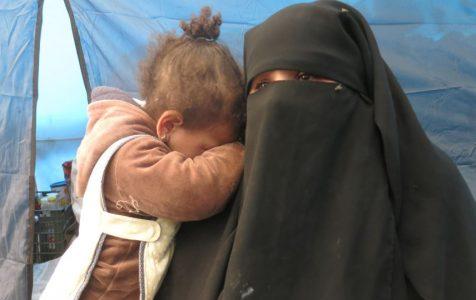
ISIS widows and Boko Haram wives – overlooked abuses in Iraq and Nigeria
International news media and research institutes have brought important attention to the hundreds of foreign women (primarily Western) and their children who have been rounded up in territory recaptured from the self-styled Islamic State (IS). Reports have outlined the complex legal issues involved and convictions of women in grossly unfair trials. The situation for these women has been grim: In May of this year, for example, the Guardian reported that 40 foreign women had been sentenced to death in a Baghdad court after 10-minute hearings for crimes including membership of IS.
At the same time, little attention has been brought to the situation of local women with alleged or suspected ties to IS or to longer-standing groups such as Boko Haram. Our investigations in Iraq and Nigeria, including almost 400 in-depth interviews across the two countries, have found that authorities and armed militia members working with the governments have branded thousands of displaced Iraqi and Nigerian women as affiliated with IS or Boko Haram, respectively, and subjected them to mistreatment and abuse as a result.
Hundreds of thousands of people fled or were forced from their homes during military operations against IS in Iraq, carried out between 2014 and 2017, and against Boko Haram in Nigeria, which intensified in 2015 and continue until now. While thousands of men and boys have been detained and forcibly disappeared in both countries, the abuse of women and girls perceived to be tied to the armed groups has primarily occurred in places where they have sought refuge, including camps for internally displaced persons (IDPs). (Hundreds of women and girls also were arbitrarily rounded up and held in military detention facilities in Nigeria, though most of them have been released).
Women who were forced from their homes in the violence often have been confined in camps because of perceived IS or Boko Haram ties. In one camp in Iraq used exclusively for families perceived to be affiliated with IS, security forces have prohibited them from leaving the camp, creating a situation of de facto detention. In Nigeria, residents of certain remote camps holding families alleged to be sympathetic with Boko Haram have likewise faced severe movement restrictions, even as hundreds of people starved to death inside. Where living in camps alongside other displaced people, women with suspected affiliations often have faced tighter movement restrictions than neighbors and discrimination in accessing humanitarian distributions, basic services, and opportunities to earn a livelihood.
In determining who is an alleged affiliate, the net of accusation and suspicion has been cast wide. In both Iraq and Nigeria, ties have often been presumed just because the family fled a stronghold of the armed group late in the hostilities; security officials demand to know why they hadn’t fled earlier. These suspicions arose despite the fact that many civilians were trapped in areas controlled by IS and Boko Haram and risked execution if they fled.
The risk of a woman being branded an affiliate was heightened if one of her family members was detained by the authorities, even though “security screenings” of people fleeing these areas in Iraq and Nigeria were deeply flawed and the number of men and boys who were arbitrarily detained and then forcibly disappeared had reached into the thousands. As a result, many of the women accused or treated with suspicion turned out to have no connections with the armed groups at all.
Indeed, a number of the women we met who experienced abuse for their alleged affiliations appeared to be victims of the armed group who had suffered greatly under their control. In Nigeria in particular, where tens of thousands of women have been viewed with suspicion, several showed us scars of punishment inflicted by Boko Haram, and told us they had been desperate to escape. Others told us that they had been abducted and forcibly married to members.
Confined in the camps, women told us they have been specifically targeted for rape to punish and humiliate them for their alleged affiliations. For example, 20-year-old “Dana” in Iraq told us: “Because they consider me the same as an IS fighter, they will rape me and return me back [to my tent]. They want to show everyone what they can do to me – to take away my honor.” In Nigeria, women suspected of possible Boko Haram ties also told us they were easy targets for rape because if they complained, soldiers, militia members, and camp officials would dismiss them as “Boko Haram wives” and subject them to further reprisals.
The confinement and discrimination these women face also renders them at increased risk of sexual exploitation, even compared to other displaced women. Many told us they have been pressured and coerced to have “special relationships” with or to be the “girlfriends” of men in positions of authority in the camps, to access basic goods needed for survival. The enforced disappearance of their surviving adult male relatives exacerbated their material and physical vulnerability. In some contexts, the sexual relations occurred in such coercive circumstances as to have amounted to rape.
Source: JS





